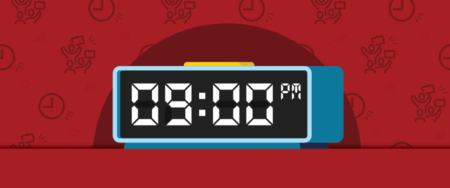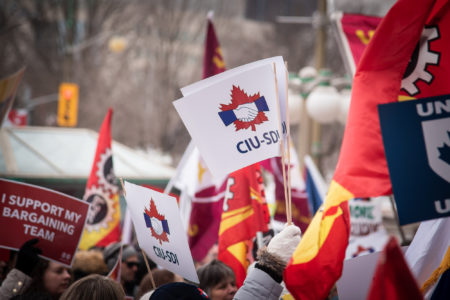To supplement the frequently updated PSAC Treasury Board strike FAQ, CIU has also prepared a complementary FAQ to further help CIU members navigate the TB strike mandate and the potential strike.
Always refer to the PSAC FAQ in addition to the documentation below to ensure you have all available information. Make sure to use the PSAC picket line finder. Should you have any questions, please consult your CIU Branch President and your PSAC regional office.
The following Treasury Board units are in a legal strike position, and could be on strike soon: PA, SV, TC, EB. There will be an announcement if a strike is declared.
The FB group is not in a legal strike position. See I’m part of the FB group. Am I on strike? Am I designated essential?, below, for more information.
The FB group is not on strike, is not in a legal strike position and is not part of the essential services framework negotiated between the employer and the union in the current context.
As per the Federal Public Sector Labour Relations Act (FPSLRA), a strike “includes a cessation of work or a refusal to work or to continue to work by persons employed in the public service, in combination, in concert or in accordance with a common understanding, and a slow-down of work or any other concerted activity on the part of such persons that is designed to restrict or limit output.”
It is therefore important that FB members not engage in any sort of slow-down or other activity designed to restrict output. FB members must continue to perform their usual duties. If you are ordered to perform duties outside of your usual duties, you should ask management to show you where these duties are in your job description. If they are not in your job description, and fall outside of your regular duties, ask for the order in writing, inform a union representative, obey the order now, and grieve later.
Outside of their work period (before/after their shifts) and during their unpaid break, FB members can still participate in strike activities. It’s important for all members to support each other.
For FB members in uniform: As FB members are not in a legal strike position, and to err on the side of caution, we recommend that members not attend strike activities in uniform. Should you choose to do so, please remember to remove your tools and name tag, and cover your shoulder flashes .
PSAC has announced that members could sign up to receive their strike pay via Interac e-transfer. CIU will be processing its own top-up pay for striking PA, EB, SV and TC members attending pickets in a similar fashion. PSAC will be providing CIU with the information required to verify attendance on weekly basis.
Your Branch may also be planning to provide an additional top-up, so please check with your Branch President.
As with the PSAC strike pay, the CIU top-up is only for members attending strike pickets/activities. It is important for members to check in/check out when attending picket lines and be present for at least 4 hours. Members who are unable to attend a picket line (due to being farther than 100km from a picket line, or for other reasons) can request an accommodation to perform alternate strike duties by contacting their PSAC regional office.
Please see the PSAC TB strike FAQ for more information regarding strike pay and picket lines.
Members occupying essential positions must continue to report to work and cannot participate in strike activities during their scheduled work period. The employer (Treasury Board / CBSA) is threatening employees in essential services positions with a $1000 fine as per sections 196 and 201 of the FPSLRA should they participate in a strike. However, this only applies to the period during which an employee in an essential position must report to work. The employer cannot prevent members in essential positions from supporting strike activities outside of their work period (before/after their shifts) and during their unpaid break.
In some cases, usually due to being recent hires or having changed department in the last few months, members may be unable to complete parts or all of the PSAC electronic registration process, including updating their contact information. While this is frustrating, in no way does it prevent striking members from participating in picket lines and receiving strike pay. Here’s what to do:
- When attending a picket line, bring a copy of your pay stub (and, if you have filled an electronic membership card or eRand card, any confirmation or screenshot showing you have completed the form). You will be manually added to the strike system and sent a bar code to be able to receive strike pay.
- Make sure a picket captain is aware of your presence and have them note your attendance. Keep a record of the picket captain’s name, and of the time you arrived (and departed) the picket line.
- If you cannot register electronically and haven’t received a barcode for strike pay, but have a PSAC membership card, bring your card with you when you attend a picket line. The barcode on the back of the card is the same that would have been sent to you by email.
- New employees who have not started paying union dues can still report to a picket line, where they’ll be able to sign a card. They may be asked to verify which Branch they belong to, either by calling a Branch representative, or by providing suitable documentation (such as a hiring letter).
- Loop in your Branch President, who’ll be able to assist you.
See the PSAC TB strike FAQ for more information on strike pay and picket line attendance.
You must ask your immediate manager for a list of essential duties. We recommend that all members in positions deemed essential do so using the following wording:
As a worker deemed essential, I must only perform essential duties. I am requesting a list of those duties.
The employer must provide you with a list of specific duties and cannot simply say “perform any task that I assign to you” without specifying which duties are essential. If, as an employee in an essential position, you are not provided with a list of essential duties, for every task you are ordered to perform, ask your manager (in writing) if this task is essential. If they say yes (or tell you that all tasks are essential), ask (in writing) why this task is essential for the safety and security of the public. Use the following wording:
As a worker deemed essential, I must only perform essential duties. Please provide me with the reason why the requested duty is essential to the safety and security of the public
Always loop in your Branch President.
If you’re in a non-essential position (PA, EB, TC, SV), you do not perform any work during a strike. Instead, report to the nearest picket line.
If you’re in an essential position (PA, EB, TC, SV), you should only perform essential duties. Ask your manager for a list of essential duties. If they do not provide one, for every task you are ordered to perform, ask your manager (in writing) if this task is essential. If they say yes (or tell you that all tasks are essential), ask (in writing) why this task is essential for the safety and security of the public (you can use the following wording: As a worker deemed essential, I must only perform essential duties. Please provide me with the reason why the requested duty is essential to the safety and security of the public). Always loop in your Branch President.
If you are a code 2 or 3 and management is asking you to come in, please ensure:
- Code 2: That you are only replacing the Code 1 person you have been identified to replace (ask your Branch President for more information)
- Code 3: That you ask the employer what specific conditions have been met for you to be called in (make sure to inform your Branch President if the employer fails to provide you with a suitable explanation)
See the PSAC strike FAQ for more information on essential services codes.
If you’re part of the FB group, you are not on strike. You may however be asked to perform duties that are not usually assigned to you. If you are ordered to perform duties outside of your usual duties, you should ask management to show you where these duties are in your job description. If they are not in your job description, and fall outside of your regular duties, ask for the order in writing, inform a union representative, obey the order now, and grieve later.
No. Your manager is trying to get you to be a scab. Don’t be a scab.
Once a strike is declared, non-essential employees who cross picket lines, report to work, or continue working from home will be engaging in scabbing activities. As best said by PSAC, a manager that cares about you would never ask you to cross a picket line or work against your best interest. Unless you are in an essential position, do not clock into work once a strike is called.
Report any instance of management trying to interfere with your right to strike to your Branch President or PSAC regional office.
We’ve heard from several members about attempts by some managers to spread misinformation about what workers (both essential and non-essential) should do. Whether you’re in an essential or a non-essential position, here are some examples of what your manager might tell you to do, when in reality, you should not do any of the following during a strike:
- Calling in every morning before the time you would normally be starting work
- Attending meetings before the time you would normally be starting work
- Calling/going on MS Teams before your regular start time, under threat of being marked absent and not paid
- Entering your strike leave on a daily basis
- Choosing to work or be on strike
- If non-essential, logging into the work computer for any reason while on strike
- Checking-in with your manager for attendance twice a day
- Picketing for 4 hours but working the rest of the time
- Performing non-essential tasks, or tasks/duties that are not a part of your regular job
- Etc.
If your manager is telling you do to any of the above, they’re telling you to be a scab. Don’t do it.
Report any attempt by management to coerce, threaten, or prevent you from exercising your legal right to strike (or any related actions) to your Branch President or PSAC regional office.
If you are in a non-essential position: You don’t have to cross a picket line. Don’t do it. Go home.
If you are in an essential position (PA, SV, TC, EB) or are part of the FB group: In the interest of ensuring the health and safety of all and proper operations around picket line, members who need to cross a picket line (members in a position deemed essential and FB members), should make sure to follow the established protocol, as communicated by the employer (CBSA):
- Essential employees must bring the essential services notice letter (paper or electronic) provided to them when reporting to the workplace.
- Essential employees should identify themselves to a picket line monitor or management representative if they experience difficulties entering the workplace.
- The following guidelines apply in the event that employees encounter picket lines upon entering or leaving CBSA workplaces:
- Employees should have their manager's contact information with them at all times. Managers must remain readily available to assist employees and provide direction in the event of difficulties reporting to work.
- Employees should contact their manager immediately or a management representative on the picket line if they experience difficulties entering the workplace or are concerned in any way for their safety.
- Management representatives will be available on-site to take the appropriate measures to ensure employee safety.
- Employees complying with these guidelines will not lose pay as a result of time lost due to attempts to cross the picket lines. Employees who do not respect these guidelines, or who do not report to work, will be considered as being on leave without pay.
Note that FB members will not be provided with an essential letter as they are not in a striking position.
To summarize:
Members who are part of the PA, EB, SV or TC units and are deemed essential, when reporting to work should:
- Present their essential letter every time they wish to enter the workplace
- Request that a manager safely escort them across a picket line
Members who are part of the FB group (and therefore not in a strike position), when reporting to work should:
- Request that a manager safely escort them across a picket line
Reminder: Members must ensure they follow the CBSA code of conduct: Do not use your job title, official identification badge or any other official document unless asked to display when on government premises.
As per PSAC, non-essential shift workers who are at work at 12:01 a.m., Eastern Time, on April 19, should walk off the job and prepare to join a picket line when available.
For shift workers in other time zones, that also means walking off the moment a strike is declared. For example, non-essential workers in British Columbia who are at work at 12:01 a.m. Eastern Time would walk off at 9 p.m . on April 18.







